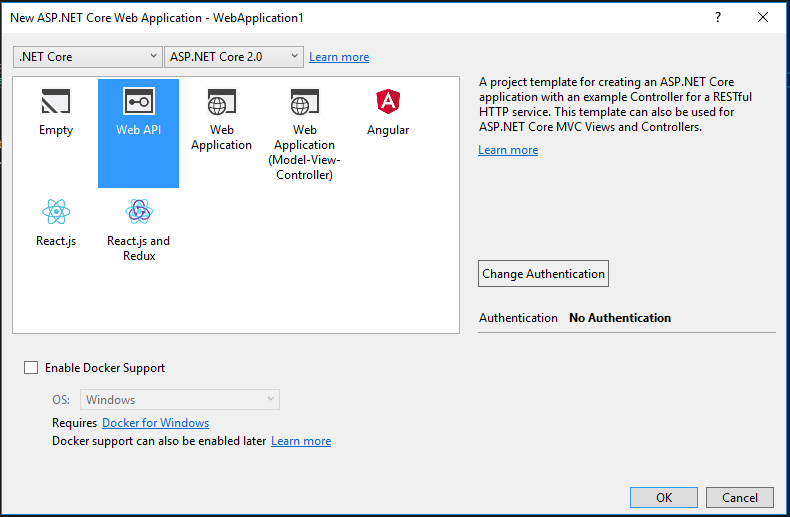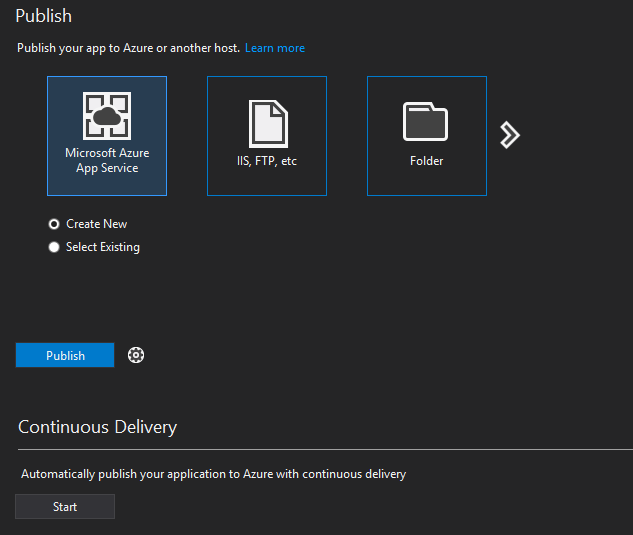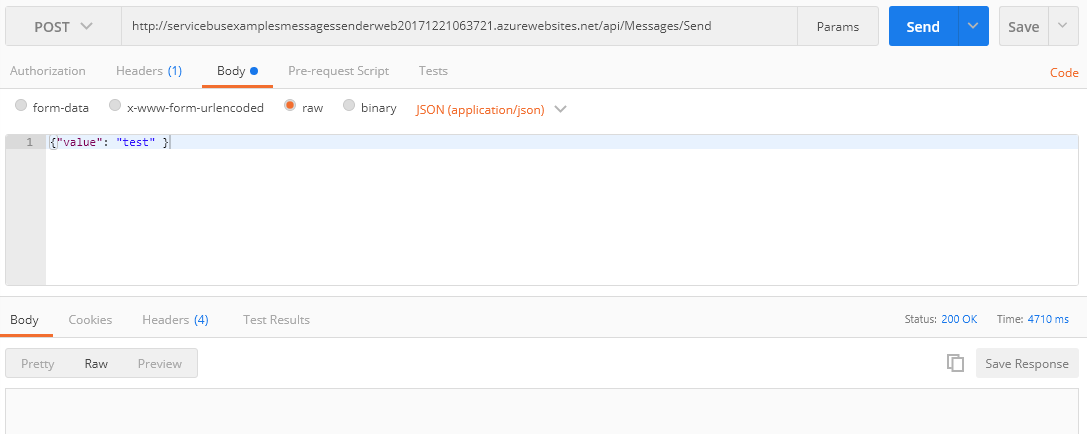ASP.NET Core is a open-source web framework that everyone are so excited about recently. There are some good arguments to be excited about it: ability to run on Windows, macOS and Linux, ability to host website in IIS, Nginx, Apache and Docker and it’s fast.
Can it be used for Service Bus scenarios?
Yes, it certainly can. Let’s create a project, that will send service bus message triggered by web request. I’ll create the simplest ASP.NET Core Web Application in .Net Core 2.0 framework.

Now lets create a helper class to connect to Service Bus.
IMPORTANT: Install Microsoft.Azure.ServiceBus nuget package instead of WindowsAzure.ServiceBus, which will not work with .NET Core.
My ServiceBusHelper class looks like this:
public class ServiceBusHelper
{
public static QueueClient GetQueueClient(ReceiveMode receiveMode = ReceiveMode.ReceiveAndDelete)
{
const string queueName = "stockchangerequest";
var queueClient = new QueueClient(ConfigurationHelper.ServiceBusConnectionString(), queueName, receiveMode, GetRetryPolicy());
return queueClient;
}
public static TopicClient GetTopicClient(string topicName = "stockupdated")
{
var topicClient = new TopicClient(ConfigurationHelper.ServiceBusConnectionString(), topicName, GetRetryPolicy());
return topicClient;
}
private static RetryExponential GetRetryPolicy()
{
return new RetryExponential(TimeSpan.FromSeconds(5), TimeSpan.FromSeconds(30), 10);
}
}
Microsoft.Azure.ServiceBus nuget package differs just a bit from WindowsAzure.ServiceBus so for creating topic you won’t use QueueClient.CreateFromConnectionString method, but rather TopicClient constructor, where you can directly pass custom retry policy.
You probably noticed that I created a ConfigurationHelper class to read vales from config. To have a connection string to your bus in a file, add appsettings.json file your peoject. Also set it’s properties to Content and Copy if newer. This way it will be copied to server when project is deployed. My configuration file looks like this:
{
"ServiceBusConnectionString":
"Endpoint=sb://bialecki.servicebus.windows.net/;SharedAccessKeyName=RootManageSharedAccessKey;SharedAccessKey=[removedForSafety]"
}
And ConfigurationHelper class looks like this:
public static class ConfigurationHelper
{
private static string connection;
public static string ServiceBusConnectionString()
{
if (string.IsNullOrWhiteSpace(connection))
{
connection = GetServiceBusConnectionString();
}
return connection;
}
private static string GetServiceBusConnectionString()
{
var builder = new ConfigurationBuilder()
.SetBasePath(Directory.GetCurrentDirectory())
.AddJsonFile("appsettings.json");
var config = builder.Build();
var value = config.GetValue<string>("ServiceBusConnectionString");
return value;
}
}
All code needed to connect to service bus is complete – congrats:)
However our job is not yet done. I mentioned earlier that I want to send messages to the bus triggered by web request. Do achieve it I need to have a controller:
public class MessagesController : Controller
{
[HttpPost]
public async Task<IActionResult> Send([FromBody]SendMessageDto mesaage)
{
try
{
var topicClent = ServiceBusHelper.GetTopicClient();
await topicClent.SendAsync(new Message(Encoding.UTF8.GetBytes(mesaage.Value)));
return StatusCode(200);
}
catch (Exception e)
{
Console.WriteLine(e);
return StatusCode(500, e.Message);
}
}
}
public class SendMessageDto
{
public string Value { get; set; }
}
Notice that there is no ApiController. In .NET Core there is only one Controller that can be used both to handle api logic and return json, or serve views for a web page.
In order for routing to work I also added some code in Startup class.
public void Configure(IApplicationBuilder app, IHostingEnvironment env)
{
if (env.IsDevelopment())
{
app.UseDeveloperExceptionPage();
}
app.UseMvc(routes =>
{
routes.MapRoute("default", "api/{controller=Home}/{action=Index}/{id?}");
});
}
Publishing to Azure App Service
Since it is much better to test an app online instead of locally, I published it with Azure App Service. It’s a powerful tool for deploying and scaling web, mobile and api apps running on any platform. Microsoft also says that it ensures performance, scalability and security, but the most important for me is that you can deploy your app within couple of clicks from Visual Studio.

Now I can test my app by making POST request like this:

And the response is 200! To sum up:
- there is no problem with writing code in .Net Core or .Net Standard using Azure Service Bus
- Core already written for regular .Net Framework will not work, but it’s not a big job to make it compatible
- Working with event hubs and relays will require to install separate nuget packages
To read more about Azure Service Bus nuget package go to this accoucement.
All code published here can be found in my public github repo.
This design works fine when its low load, but try doing 100k + web requests an hour and the service bus connection falls over.
The send never completes and times out.